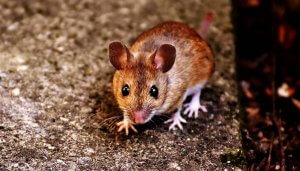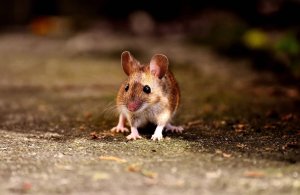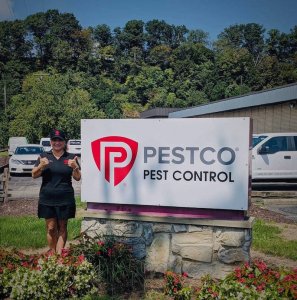How quickly can mice breed within your Pittsburgh home? Well, they actually reproduce more rapidly than rabbits.
One single female can produce five to 10 litters annually, averaging six to eight offspring per litter.
In terms of numbers, this means that six mice can become 60 over the course of just three months!
Yikes, right? All of this underscores the importance of qualified, ongoing pest management services, especially in the Fall season.
Read on to learn more about mice and the breeding patterns, what you can personally do to help prevent them from entering your Pittsburgh home or call our teams today for the friendliest, Quality Pro-certified pest control services in all of Pittsburgh! (412) 252-5200

Appearances can be deceiving. While the sight of a mouse scampering across a carpet or under a cabinet might not be as frightening as that of one of its rat cousins, make no mistake.
Mice contaminate food and are serious vectors of diseases that can make humans very sick.
Our pest-control and pest-management specialists at Pestco are often called upon to deal with a mouse infestation, and they are often confronted with significant damage to a home.
Mice love chewing on electrical wiring and are often the cause of many household fires. It is far from comforting but nevertheless important to know that mice can also chew through soft concrete; wood; drywall; rubber; plastic pipes; insulation; aluminum and even gas lines.
Unfortunately, mice will aways find a way to gain ingress to a home or residence. They can fit through a space the size of a dime.
Prime entry points include: holes and cracks in a foundation; outer walls; doorways and openings around windows, chimneys, roof vents and wherever pipes and wires enter a home or residence.

Their innate abilities which include: jumping, climbing and swimming, make it nearly impossible to prevent them from getting inside.
Mice will chew and eat through anything their come across.
They are particularly fond of grains, and they can easily transform a box of cereal or crackers into dust in very little time.
They are known to eat 15 to 20 times a day, and their nests can usually be found near a food source like a kitchen pantry.
Experts estimate that mice contaminate some 10 times more food than they actually consume.
Follow these 9 fall rodent prevention tips!
A Bit Of Mouse History
Although the exact origins of the mouse is still a subject of debate, it is believed that they date back about 75 million years to Asia.
Today, however, mice are found everywhere humans are even in poems like: The Night Before Christmas when “not a feature was stirring not even a mouse,” and in the writings of Aesop’s Fables.
The earliest known domesticated mice were kept in the royal palaces of Japan and China. By the 1700s, many varieties were domesticated as pets in both China and Japan, and Europeans imported favorites and bred them to local mice.
In Victorian England, “fancy” mice were prized and traded, and a National Mouse Club was founded in 1895.
Throughout history, mice have been both worshipped and maligned.
How Fast Do Mice Reproduce?
Mice reproduce more rapidly than even rabbits, lending some contention to that old expression.
Sexual maturity occurs very early, at just 4-6 weeks of age.
Male mice attract a mate by ‘singing’ ultrasonic songs and via pheromones only other mice can detect.
Gestation lasts less than a month, and one mouse can give birth to 5 or 6 babies.

A typical female can birth between five and 10 litters per year. To make matters even worse, mating can occur again immediately after giving birth, creating a second litter in just 25 days after the last one.
Mice have incredible breeding capacities due to their rapid maturation process and no household ever has just one.
The pest-control and pest-management specialists at Pestco are well aware that living indoors enhances these capabilities even more because they will not be hampered by cold weather and can breed all year long.
Outdoor mice can only breed during spring, summer and fall, but indoors there are no limits. One single female can produce five to 10 litters annually, averaging six to eight offspring per litter.
In terms of numbers, this means that six mice can become 60 over the course of just three months!
This breeding cycle continues until the mouse dies and by the time that occurs, her offspring’s offspring have also birthed a few litters and they too are starting to breed.
How Long Do Mice Live?
While the average mouse lifespan is only about 12 to 18 months outdoors, this number can climb to 2 to 3 years in the case of indoor mice because they have access to food and shelter and they aren’t exposed to harsh environments or natural predators such as: rats, snakes and owls.
House mice thrive around humans and the only real threats to their survival are disease, humans or pets.
When born, mice are blind, barely the size of a quarter and their weight is about the same as a single sheet of paper.
Due to the pink color of their hairless bodies, they are sometimes referred to as ‘pinkies’.
Humans, with the exception of our pest-control and pest-maintenance specialists at Pestco, don’t often see babies unless they can locate the nest. At about two weeks of age, their eyes open and they have developed body hair.
Within the span of just another week, mice pups are weaned from their mothers, leaving the safety of of the nest and foraging for their own food.
Surroundings dictate their diets, and mice will eat anything from dry foods and fresh or rotting produce to insects.
Their favorites include: sweet fruits and berries, nuts; almost any kind of meat; grains and seeds; plants and dinner left overs.
Their preferences, however, are often for the same foods their mother ate while pregnant. They can survive on a minimum of an ounce of food and water a day.
Humans inadvertently attract mice in a number of ways.
A homeowner naturally wants to keep a residence warm in winter, but for mice when outside temperatures start to drop, the warmth of a home that they can detect through wall openings is an irresistible invitation.
According to the teams at Pestco, hot water heaters are an especially favored spots because they provide a steady source of heat and are usually hidden from sight, which allows them to burrow.
Because mice love to nest and burrow, they will often seek out cluttered spots to make themselves at home.
These areas tend to be in garages, attics, and small storage spaces.
Firewood also attracts mice and home owners should avoid storing it directly on the floor or up against the walls. Storage spaces, such as closets and pantries, can also be problematic, as boxes make wonderful nesting places.
Some Relevant Statistics
According to the United States pest control industry, an average of 7 billion dollars is spent annually on rodent infestations in homes and commercial spaces.
A survey conducted by the National Pest Management Association (NPMA) indicated that nearly one-third of American homes and businesses (29%) have suffered from a rodent infestation during the fall and winter months of the year primarily in restaurant and home kitchens.
What Mice Species Exist in Pittsburgh?
The Common House Mouse and the Deer Mouse are the two species that commonly invade Pittsburgh residences.
They are similar in appearance as both have tiny ears, pointed noses, black beady eyes, and thin tails that are about the same length as their body.

They differ in habitat and present different problems.
The Common House Mouse prefers the inside of homes and once they gain ingress, they reproduce quickly and invade every nook, cranny and wall void within a residence.
The Deer Mouse live outdoors in openings formed naturally in trees, hollowed-out logs and under stones and yard clutter.
They are considered a health hazard, however, once they infest cellars, attics and crawl spaces.
Indications Of Infestation And Some Prevention Tips
Sightings of mouse droppings, chewed food packaging, nesting material or nocturnal noises coming at night from behind walls or from the attic are signs that a home is infested with mice.
Unusual pet behavior is another indication.
Dogs and cats might begin to scratch or paw at small crevices such as: under the refrigerator or oven or behind and under furniture.
This warrants a closer look even though homeowners may not be happy with what they find.
The best way to eliminate mice is with classic wooden snap mouse traps.
They will work for light outbreaks, but not for larger ones.
Because of the risk of disease and the fact that they reproduce so quickly, home owners should seek outside help from the pest-control and pest-maintenance experts at Pestco immediately.
Prevention is the key to preventing mice from entering your home, and while good sanitation won’t eliminate them, there is no question that poor sanitation will attract them.
The following tips can aid in dealing with a mouse outbreak.
Vacuum Floors But Not Droppings
Vacuuming is important and should be done on a regular basis in conjunction with wiping down counters and eliminating crumbs and any access to food sources. Store food in glass jars or airtight containers and always secure garbage.
Never vacuum or sweep up mouse droppings because they can release more bacteria into the air and the dust can cause severe illness.
Clean Up Any Affected Spots
Always wear a mask and latex or vinyl gloves while cleaning up mouse-infected spots.
The Center for Disease Control and Prevention (CDC) recommends spraying the area with a commercial disinfectant or mixture of bleach and water and letting it sit for five minutes before using paper towels to wipe the area clean.
Place the dirty paper towels into a plastic bag and leave in outside garbage.
The entire area should then be disinfected.
Eliminate Any And All Entry Points
Search carefully around the perimeter of the home and seal up any cracks or holes in the foundation that can serve as entry points.
A good rule of thumb is to consider sealing any crack, hole or opening that a pencil can fit through.
Clear away any piles of wood, leaves or other debris near walls.
Caulk around doors, windows and wherever wires and pipes enter. Check roof and roof vents for damage or holes and repair as needed. Maintain clean gutters as well.
Avoid Using Plastic, Rubber Or Wood Sealants
Use weather stripping on door and window gaps and make sure the sweep on the door creates a seal against the threshold when it’s closed.
The corner posts of a home, which cover exterior edges where siding intersects, are particularity vulnerable because they are hollow and easy for mice to climb.
They will require steel wool pads or copper mesh to secure any gaps.
J channels, which are placed around doors and windows on the exterior and serve to conceal the ends of vinyl siding, are best protected with the application of silicone caulk.
Fortify The Chimney With A Metal Sheet
Chimneys are vulnerable access points because rodents can easily climb down to gain entry into a home’s interior.
This can be avoided by installing twelve inch wide sheet metal at the chimney’s base.
This will make it too slippery for rodents to climb.
Place Moth Balls Near Possible Entry Points
Mice as well as other rodents cannot tolerate the smell of mothballs.
During the winter months, place a few near vulnerable entry points but far out of reach from pets and small children.
Thin Out Your Home’s Hedges and Bushes
Dense vegetation provides the perfect hiding places for mice.
Thick dense bushes and shrubs should be thinned out to reduce niches for mice and other rodents. Keep weeds to a minimum as well.
Protect The Home Foundation With Gravel
A strip of heavy gravel placed strategically around the home’s foundation can prevent rodents from nesting and burrowing.
The Friendliest, Most Certified Pittsburgh Mice Control
We have been a leader in pest-control and pest-management solutions throughout Pittsburgh and western Pennsylvania since our formation in 1948.
Our consistent growth over the last seven decades is largely due to our delivery of superior services, products and strategies to companies and residences afflicted with pest infestations of all types.
Even more, we always aim to offer the friendliest pest control services in all of Western Pennsylvania!

We are a five-star, family-run, Quality Pro Certified pest control company. We are also Google Guaranteed, Sentricon Certified and proud members of the National Pest Management Society. Even more, 2 of the 7 Ace-certified technicians throughout all of Western PA are a part of our close-nit family!
Our technicians attend company workshops to ensure they are always on top of and a few steps ahead of the pests they encounter.
They are highly knowledgeable and trained extensively to address the unique challenges of each infestation.
Our integrated pest-control and pest- management services (IPM) have a practical, hands-on approach that entails an extensive and thorough examination of the affected home and the sealing up of any cracks and crevices that might permit rodent ingress.
Call our teams today and let us help you with your mice infestation before it really gets out of hand!
Photo Credits: Pixabay
 Over 300 Reviews
Over 300 Reviews 